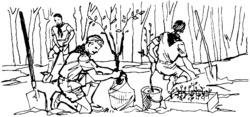 Has this ever happened to you? You spot a parent at a troop meeting, chat with him or her and decide they’d be a good fit for a particular task you have in mind. After discussing it, they agree to take on the job, and you give some basic direction. Later that month at the committee meeting, they either don’t show up or report that nothing much has been done. We tend to brush it off as “everyone’s busy” and let it go, but as the weeks go by, there really isn’t any further progress. You really hate to bug them – they did volunteer, after all – but something has to move forward.
Has this ever happened to you? You spot a parent at a troop meeting, chat with him or her and decide they’d be a good fit for a particular task you have in mind. After discussing it, they agree to take on the job, and you give some basic direction. Later that month at the committee meeting, they either don’t show up or report that nothing much has been done. We tend to brush it off as “everyone’s busy” and let it go, but as the weeks go by, there really isn’t any further progress. You really hate to bug them – they did volunteer, after all – but something has to move forward.
Sound familiar? Continue reading “Motivating volunteers to commit”





